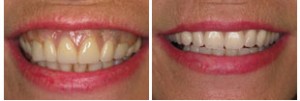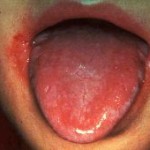Though dentures are often checked for fit and comfort during dentist appointments, they often wear out or cause sudden problems, such as mouth dryness, increased salivation and discomfort. According to Net Wellness, this is most often due to regular changes in the size and shape of your gums, causing your dentures to fit differently from how they once did. Increased salivation can be a daily hassle for many people, leading many to wonder how to return to their regular lives.
Although this may be a short-term major problem, but the patient may find it so inconvenient and embarrassing that they actually refuse to wear denture. Therefore, it is always comforting to know that this symptom usually lasts only a few days and gradually tapers off to normal. The dentist must maintain a calm, kind attitude and offer emotional support to help the patient get used to their dentures and also understand that this is just a temporary phase that will soon pass. The physiologic symptoms noted in these patients with this problem are a flow of blood through the salivary glands and their excessive stimulation.
Causes for hypersalivation to occur arising from the dentures are:
- Incorrect centric jaw relation registrations. When the dentist asked the patient to bite as usual, the patient usually tends to position their lower jaw further in front than normal. The dentist should be able to recognize this and slowly guide the patient’s jaw into the correct position, or teach the patient how to position their lower jaw.
-
Excessive vertical dimension (VDO)
- Overextension of denture borders
- Pain and excessive pressure on the oral mucosa
- Pressure upon nerves
- Excessive stimulation of the salivary glands from the denture acting as a foreign body. You will probably salivate a lot more when you first start wearing dentures, especially if you are wearing dentures for the first time. This is a natural bodily response to something being placed in your mouth and soon subsides.
- Excessive thickness of the dentures restricting the tongue in its static state, as well as in function. The usual thickness of a denture is similar to a sheet of dental wax, which is around 2mm.
- The patient’s anxiety about possible failure of the dentures
Instructions
- Place the dentures in your mouth and check for a proper fit. This may require a trip back to the dentist, which may result in a replacement of the dentures or relining of the denture base.
- The usual etiologies are emotional stress, pain in the oral cavity, reflex stimulation by the dentures, or a combination of all of the mentioned.
-
If the vertical dimension (the height) of the denture is inaccurate, you might experience drooling from the corners of the mouth. To stop this, the dentures have to be thickened by the dentist, which is usually done by the means of refabricating a new set of dentures. Extra thickness can be added to the upper denture, the lower denture, or both, depending on the circumstances.
- Rest your gums. According to Net Wellness, salivation often is due to the increased stress on gums, so it may help to work up to wearing them more often. Dentures should be removed at least six hours per day.
- Suck on hard candies or lozenges. It’s not very often that a dentist will advise you to have sweets but it helps to have something like boiled sweets or mints (try to get SUGAR-FREE!). Because dentures are a foreign object, your brain may signal to your mouth that the dentures are “food,” causing you to produce saliva to “digest” them. By sucking on something for the first few hours of wearing your new dentures, you unconsciously swallow more and remove the temporary increase in saliva. Sipping and swallowing small amounts of water from time to time will also reduce the buildup of saliva in your mouth.
- Inspect the seal on your dentures. Sometimes it only seems as though there is increased saliva production because much of it is trapped under the dentures where they were not sealed properly.
-
If you already produced excess saliva naturally (epiglotitis) or due to any other medical conditions, you could have gone in for implant dentures instead of conventional full dentures, unless cost was the prohibiting factor.
Treatment options are usually small doses of opiates or atropine sulfate for the first day. These may produce desirable effects. Other than that, kind, sympathetic treatment from the dentist with understanding and reassurance are essential. And sometimes this alone may effect the cure without any intervention from any drugs.


